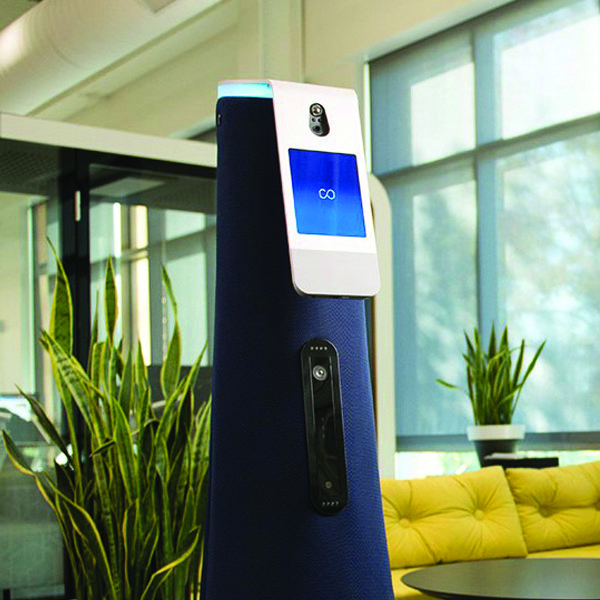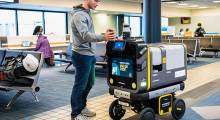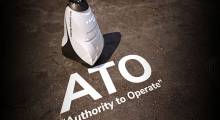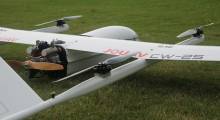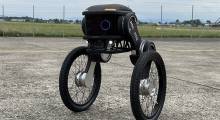When William Davis was hired to serve as Ally Financial's senior director of physical security, part of his job was to help the digital bank reevaluate how it uses technology as part of its safety systems.
“I was brought in to restructure the whole physical security program with a clean slate,” he told Robotics 24/7.
That was in 2018, just a few years before the COVID-19 pandemic upended the world and forced many companies to reassess the role technology plays in their operations. While Ally was just having initial discussions about bringing in automation at the time, the pandemic accelerated the company’s timeline, Davis said.
It needed to start offering temperature screening, masks, and other tools to help ensure that people stayed far enough apart.
Security robots answer the call
The team decided to enlist Cobalt Robotics, a provider of security robots, to help it get the job done.
The Fremont, Calif.-based startup had just recently added temperature screening to its mobile robots in response to the pandemic. The robots also can detect how many people are in a room and feature remote monitoring capabilities and real-time incident reporting systems.
In 2020, Ally invested in 16 robots that were deployed in various locations across the country through a robotics-as-a-service (RaaS) model.
Once things opened up more, it scaled back and decided to deploy just two robots at its headquarters in Charlotte, N.C, a 26-story high-rise building in the heart of the city that employs around 2,600 people. It subsequently installed them at its office in Jacksonville, Fla. Later this year, it will be deploying Cobalt robots at its site in Lewisville, Texas, which is currently being renovated.
The company is keeping the robots in mind as part of the reconstruction process, Davis explained. That includes installing elevators that work well with the robots and putting actuators on doors so the robots can open them.
He added that robots are a good fit for the company as it redesigns its spaces to be more “open and frictionless.”
Robots help address labor challenges, but humans still essential
Davis brought up concerns about labor shortages, noting that the company has struggled to find enough human workers to work security jobs. By bringing in the robots, the company said it is not only addressing that issue but has also been able to increase overall efficiency.
“These operate at one-third of the price of a security officer, Davis said. “We’re able to reduce the number of mobile patrol officers that we have in our buildings. There is a very tangible return on investment.”
The robots have also been useful in helping save lives in ways a human worker couldn’t, since they can detect elevated levels of hazardous gases and other types of infrastructure leaks, said Davis.
He added that humans will always be a part of the process, however. Davis has assigned a dedicated group to track the robots' notifications and other functions on-site.
“Somebody has to respond to alarms. Somebody has to respond in case of a medical emergency. We're not quite there yet with the robots, but they're a great addition and an enhancement to our physical security team,” he said.
Cobalt keeps track of the monitoring system
Erik Schluntz, chief technology officer at Cobalt Robotics, said the company’s monitoring platform is deeply integrated into the whole process. Cobalt primarily monitors the systems to identify any security or safety risks. If there are, the company then notifies Ally.
One of the benefits of that system is that Cobalt can protect Ally from having to deal with any false positives, Schluntz said.
“Any system is going to have false alarms, and we want those to come to us first, so one of our human operators can say, ‘That’s a false alarm. We don’t need to bother the customer with this,’” he told Robotics 24/7. “That way, they are not getting tons of spammy alerts. They’re only getting the important things.”
Ally looking to bring more insights in house
Ally Financial and Cobalt Robotics work closely together on the project and communicate with one another regularly, the companies said. Ally regularly suggests new features, Davis noted.
One of Davis’ requests is for the robot to have the ability to identify “bad actors” in a facility, a list of people that the bank has identified as being harmful to operations. That would require the robot to use facial recognition. Davis said he understands that there could be some privacy concerns with that approach but noted that it would be great if the bank could have greater insight into the data the robots are picking up through their cameras.
Schluntz told Robotics 24/7 the company actually offered that feature a few years ago but noted that customers did not want to turn it on because it is a hot-button topic and some states have regulations on the technology.
That being said, Schluntz said the company will work with Ally to see if they want to try it out.
Davis added that while the robots primarily operate through Cobalt’s command center, the Ally team is in the process of integrating the robots more closely into its own platform so it does not need to rely on Cobalt’s operations as much.
“Once that integration is complete, our team will be able to see those alarms and manage the robots firsthand,” he said.
About the Author
Follow Robotics 24/7 on Linkedin
Article topics
Email Sign Up

